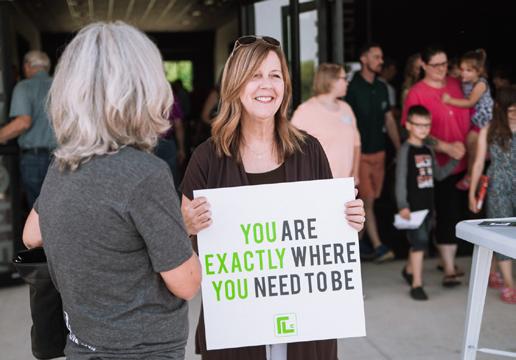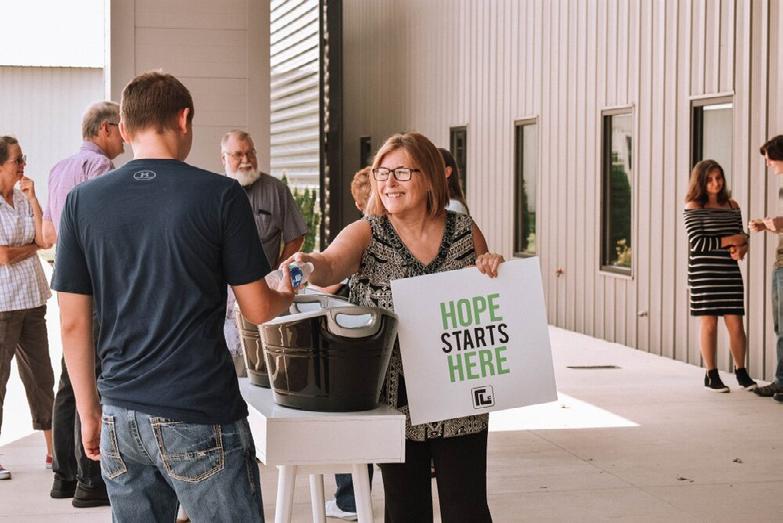
7 minute read
Called to Plant
By Vince Daniel, Director of National Missions
It was a Tuesday. I had been fighting the call to preach for nearly a year. I moved states. I blamed my wife. I couldn’t keep a job. I was running, and it was obvious to everyone but me. But that night, that Tuesday night, in Mountain Home, Arkansas, God spoke so clearly through an evangelist. He had just marched around the entire church. He was stomping and wiping sweat from his face and the pages of his Bible. Then he stopped right at the pew I was sitting at, looked at me and asked a question I didn’t have a real answer to: “Why aren’t you preaching?”
Advertisement
And everything changed. I fell to the floor in repentance to God for running, and at the end of the night I stood and proclaimed, “If God wants me to preach, I will preach!” Within two days, I received my first call to fill in at a church about an hour from our home. Within six weeks I was a full-time pastor at a church in Melbourne, Arkansas, where my ministry started.

I know this article is titled “A Call to Plant,” but I need to assure you that I know what it means to be called, to have something speak so deeply to your soul that there is nothing else you can imagine doing.
It was eight years after that initial call that I felt it again. My family and I were in an established church that was growing and doing well. We had been the pastor for 3 years, and God had done some amazing things while we were there. But I was struggling, not with my ministry or my marriage. Both were thriving! I was struggling with an ache in my heart for an area that was dear to me. We had driven through north-central Arkansas a few weeks earlier, and God, as only he can do, broke my heart. I couldn’t sleep or find peace. As a result, we resigned from the church. It didn’t make sense to those that knew us. In fact, it didn’t make sense to us. We had resources, facilities, people, and opportunities. But God called, and we had to listen. In the next year, we learned a lot in regard to planting a church (I am not being completely honest. We didn’t know a thing!). With $1200, a used soundboard, and borrowed chairs from every church that would send any, we opened Real Life Church.

I knew God had called us, but I wasn’t sure of what all He had placed in us to complete the task. That may be where some of you are right now. You sense that God is moving in a radical way in your heart to plant or do something different, but your just not sure. I want to lay out what we call some non-negotiables in church planting. After each one will be some definers for each attribute.
1. Visioning capacity
Can you see what WILL BE there? This quality is THE required element to planting a church. The people you reach will follow it. Your ministry will be focused and effective because of it. It is so critical. Just to be fair, it is also the portion that makes you sound just a little crazy to those around you. I can remember painting a wall in our first building and the person painting with me said, “I can’t wait till we have 40 people here on a Sunday.” I didn’t know how to respond to the statement, because I already knew that God was about to show up in a mighty way. You have to see what God is going to do.
Here are some things to help you know…
• Being a person who projects into the future beyond the present.
• Developing a theme that highlights the vision and philosophy of ministry.
• Persuasively selling the vision to the people.
• Approaching challenges as opportunities rather than obstacles.
• Coping effectively with non-visioning elements.
• Not erecting artificial walls or limits either overtly or subconsciously.
• Establishing a clear church identity related to the theme and vision.
• Believing in God’s capacity to do great things.

2. Intrinsically motivated
I’ve heard that integrity can be defined as, “who you are when no one is watching.” I tend to use the word GRIT. There are no teams to start, you will not have a staff. Are you able to get after it so that the above-mentioned Vision gets accomplished? Before facing Goliath, David asked, “Is there not a cause?” We know God gave the victory, but David had an intrinsic motivation to fight for his cause.
Do you:
• have a desire to do well and a commitment to excellence?
• have stick-to-itiveness and persistence?
• have initiative and aggressiveness without the negative connotations?
• have a willingness to work long and hard?
• have the qualities of a self-starter with a willingness to build from nothing?
• have a high energy and vitality level; physical stamina?

3. Creates ownership of ministry
When casting a vision, the vision must be compelling so that people want to go with you. When they come with you, you must create in them the knowledge that this is as much their mission as it is yours. People will also invest (time, talent, and treasure) in what they have a part in. Church planters don’t just point the way, they lead the charge.
Who will you take with you?
• helping people to “buy-in” and feel responsible for the growth and success of the church
• gaining commitment of the people to the vision
• establishing a congregational identity
• avoiding stereotyping of the congregation by imposing unrealistic goals for which it cannot claim ownership


4. Relates to the unchurched
Jesus came to save those that are lost. Our commission in the gospel is to go, evangelize, and disciple. You must have the ability to be comfortable with the lost in order to reach them. I know for me, this took some homework. All of my relationships were with church people. It is incredibly hard to lead someone to Jesus that has known Him since childhood.
Can you get outside your walls?
• Communicating in a style that is understood by the unchurched.
• Understanding the “psychology” or mentality of the unchurched.
• Moving and functioning in the “personal space” of the unchurched without fear.
• Quickly getting to know the unchurched on a personal level.
• Breaking through the barriers erected by the unchurched.
• Handling crises faced by the unchurched.


5. Spousal cooperation
This one may seem like a no-brainer. “Pastor Vince, Where the Lord leads, my spouse will follow!” I am sure your spouse loves you and wants the best for the ministry God has called you to, but have a real conversation about the loneliness of planting a church. You will need your spouse in this season in ways that you cannot imagine. Your spouse will be your sounding board, your defender, and at times the only one that believes in you.
Make sure they are on board by:
• having an explicit agreement regarding each partner’s respective role and involvement in ministry.
• having explicit rules regarding the use of home as an office.
• evaluating the consequences of ministry demands upon the children.
• functioning as a team through individual and collective action.
• having a strategy for dealing with strangers.
• modeling wholesome family life before church and community.
• agreeing upon and sharing the ministry vision.
• deliberately planning and protecting private family life.

I hope that these points are informational, but more than that I pray something ignites in your heart to step out, to ask the next question, to hear the Call to Plant.
Maybe you’ve seen others and thought, “I can’t do it.” Or you’ve been burdened about an area and thought, “It doesn’t need another church.” These are common lies the enemy tells every planter or person seeking to step into the adventure of planting. Well, you are capable of more than you know, and if there are people that do not know Jesus the local church is still Plan A.













